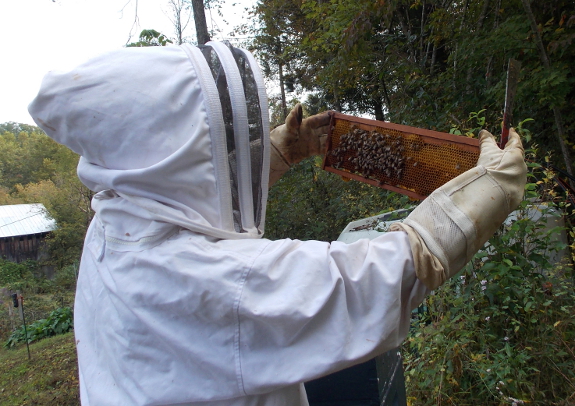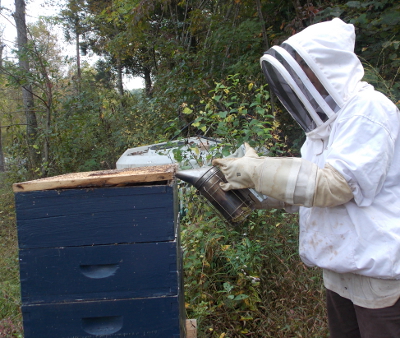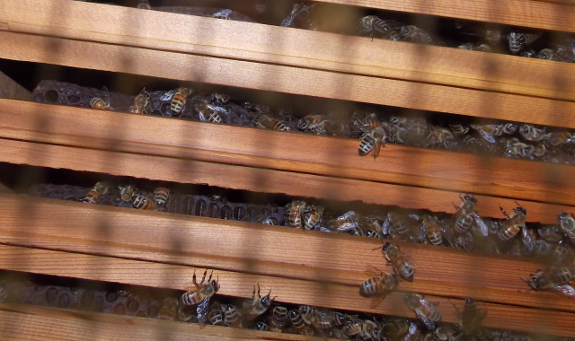
Preparing the hives for winter

We had such a strong
late-summer nectar flow, I neglected to check the bees in September.
Usually, that's when I decide if I need to start feeding to ensure
the colonies make it through the winter, but how could they need
more honey when I'd fed the two weaker hives all spring and early
summer, and the wildflowers had taken care of the early fall?
 Well, I was wrong.
The barn
swarm was in
the worst shape, having only colonized one super. I knew
that the colony was a gamble since they got such a late start, but
it was still a shock to see the whole hive empty except for six
small frames partly full of brood, pollen, and honey. I
don't know what I could have done differently, except maybe if I'd
kept feeding through the nectar flow, and chances are this hive
will perish over the winter. Still, I'll help them as best I
can, removing the empty brood box, putting the colonized super on
the bottom and the empty super above them just in case they want
the space, then cobbling together a Warre-style
quilt out of an extra super to provide insulation on top of
the hive. And I'll feed as long as they'll take it.
Well, I was wrong.
The barn
swarm was in
the worst shape, having only colonized one super. I knew
that the colony was a gamble since they got such a late start, but
it was still a shock to see the whole hive empty except for six
small frames partly full of brood, pollen, and honey. I
don't know what I could have done differently, except maybe if I'd
kept feeding through the nectar flow, and chances are this hive
will perish over the winter. Still, I'll help them as best I
can, removing the empty brood box, putting the colonized super on
the bottom and the empty super above them just in case they want
the space, then cobbling together a Warre-style
quilt out of an extra super to provide insulation on top of
the hive. And I'll feed as long as they'll take it.

The two Warre hives
are in better shape, but don't have as much honey as I'd
hoped. In fact, the hive I
dusted with powdered sugar this week had three empty boxes
(which I removed)! I had wondered how a hive we started as a
package this spring could have used up so many boxes so fast, but
the boxes on top were full, so I kept adding more. With only
two boxes colonized, I'll start feeding them to ensure they have
enough honey. Meanwhile, our oldest hive, started as a
package in spring 2012 then losing half their workers to a swarm
in spring 2013, never made it into their third box either, so I'll
feed them as well.
The two Warre hives
are in about the same state our
single Warre hive was in last fall, so I'm not terribly
concerned about them making it through the winter (although
feeding until it gets cold won't hurt). And the word on the
street is that all the rain made this a tough year for bees in our
area, so I guess it's not so bad I'm stuck feeding them
again. Maybe next year they'll finally get off the dole and
make some honey for me?
Want more in-depth information? Browse through our books.
Or explore more posts by date or by subject.
About us: Anna Hess and Mark Hamilton spent over a decade living self-sufficiently in the mountains of Virginia before moving north to start over from scratch in the foothills of Ohio. They've experimented with permaculture, no-till gardening, trailersteading, home-based microbusinesses and much more, writing about their adventures in both blogs and books.
Want to be notified when new comments are posted on this page? Click on the RSS button after you add a comment to subscribe to the comment feed, or simply check the box beside "email replies to me" while writing your comment.
